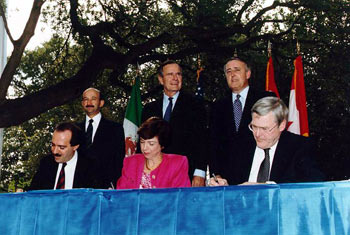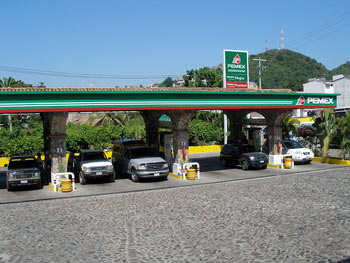Currency
markets base their complex decisions on economic precepts as
dogmatic and obscure as those of any religion. Certain
indicators instantly affect currency markets. They include
regularly published statistics such as unemployment figures
and stock market indices and government policy changes such
as the privatisation or nationalisation of industries, or
changes in taxation policies. But how do traders react to
the statistics? Which bible do they use?
In these
final phases of pure market economics or 'neoliberalism',
that bible is the brainchild of the Washington Consensus.
Few religions are run on a consensus basis (the Washington
'Consensus' is a consensus of one), or are run on a
consensus in name only. However this non-consensual trade is
written into every unilateral trade agreement the US offers
and is also enshrined in NAFTA.
|

NAFTA initialing
ceremony, October 1992
(US Federal Government)
|
Peso up, Peso down
Why do
currency traders react in such a herd mentality? Who writes
the currency-trading rulebook? Could not traders in Zurich
and those in New York base their decisions on different
tenets?
Traders
are continuously making split-second decisions in a global
currency market, networked by computers in 24-hour trading
and these markets have daily transactions in trillions of US
dollars. The traders trade for profit. A delayed or bad
decision can cost hundreds of millions of dollars, and so a
mutually agreed rule system is essential.
As an
example, the reaction at the global currency markets to the
publication of a Mexican economic indicator such as the
national unemployment rate is instructive. If unemployment
goes up by two per cent in the third quarter, how will the
global currency markets react? The theory predicts that this
will eventually lead to cheaper Mexican labour. It could be
argued that this has both a positive and a negative affect
on the Mexican economy; positive because higher unemployment
means cheaper labour, which means higher profits for the
private sector and reduced public sector costs (depending on
the power of unions in both sectors). It is negative because
higher unemployment means a higher cost to the government in
social security, lowered government tax income, and possible
weakening of domestic demand. But how should the currency
markets interpret this statistic? Who governs union power,
minimum wages and so on?
What is
the knock-on effect on US documented and undocumented
immigrants from Mexico? Repatriated earnings are the second
largest income source for the Mexican economy. In the same
way Irish banks transfer many euros to the Baltic states
from guest workers, Mexicans in the US (both documented and
undocumented), save money to send dollars home.
All of
this interplay may require that the Mexican Central Bank buy
or sell international currencies in an attempt to react to
these changes and maintain their currency's relative value
(relative to the USD or a basket of international
currencies). The net
result of such currency stabilising transactions is often
the transfer of hundreds of millions of US dollars from
Mexican Federal Reserves to the profits of offshore
derivative funds (the institutions trading in Mexican
Pesos).
Colonial
power is much less subtle than its cousin, economic
hegemony. [4]
Cultural
precepts such as architecture, religion and language take
centuries to inculcate into the minds of the local
population, a process essential to colonial expansion. If
you want to move more quickly toward domination of a foreign
economic resource, only two significant exercises of power
create change in a short period of time; military might and
economic leverage. In the absence of a military invasion of
Mexico, only economic leverage can result in significant
transfer of ownership of Mexican resources in a short period
of time.
Enter,
centre stage: Economic Hegemony.
A
Concrete Example
Currency
relationships can be explored using a practical example. In
my pocket I carry Mexican pesos drawn from a US account from
a Banamex ATM in San Miguel's town square. In Spanish times,
I would be carrying silver or golden coinage made from
metals mined nearby, but owned by the Spanish Crown. Now I
use my Mexican paper currency to purchase my necessities at
a daily adjusted rate.
In an
attempt to protect their national assets, the founders of
the Mexican state wrote rules into the constitution designed
to protect the nascent state. But constitutions are pliant
things, especially in Mexico, with more than 400 current
amendments. Among those national assets explicitly protected
from foreign exploitation and ownership are national
resources such as oil, gas, and banks. There are many
powerful Mexican national controls to protect Pemex, the
national oil company.
[5]
|

A Pemex petrol station
in Puerto Vallarta, Jalisco
(Coolcaesar, October 2005)
|
Banks are
charged with the care of the people's money and have been
rescued in the past by public funds, which means they are
particularly important for economic dependence. In an effort
to rescue its economy from a crisis so deep that it affected
the whole region with a malaise known as the ‘Tequila Effect',
changes in Mexican laws on Foreign Direct Investment (FDI),
and restrictions on foreign ownership of Mexican banks were
relaxed to encourage foreign investment. The results were
swift. All ten Mexican banks were rapidly bought up by Western
Banks, mainly based in the US and Spain. Radical yes, unusual
no! At that same time a wave of banking consolidation swept
the Western World. In many countries (including the US),
takeovers were restricted by national banking laws protecting
local banks from foreign ownership.
Twelve
years ago I lived in San Francisco, California. I had opened a
bank account in the local branch of the San Francisco Federal
Bank; within five years I had a CitiBank account. San
Francisco Federal was bought by First Nationwide, then First
Nationwide was acquired by California Federal Bank, which was
snapped up to become CitiBank (West). I now draw Pesos from
this account at Banamex (sixty-five per cent owned by CitiBank).
Technically I am a CitiBank West customer using a foreign
Banamex teller machine, both entities being part of the
largest private bank on the planet (CitiCorp, the owner of
CitiBank). Robert Rubin is a recent CEO of CitiCorp. Once
Secretary of the US Treasury, Rubin is also a former head of
the US National Economic Council. Before that he worked at
Goldman Sachs, then the largest investment bank in the world.
He is also credited in his biography with acting to stem
Mexico's financial crisis and 'opening trade policy to further
globalization'.
If Mr.
Rubin is not an architect of this 'Washington Consensus', then
who is?
Certain
weakened US Federal regulations persist, for the moment, to
keep US CitiBank subsidiaries separate in name at least. The
rules, designed to restrict the size of any one bank in the
federal United States of America, are a legacy of the horrors
of the 1930s depression in which CitiBank was indicted. But CitiBank was also implicated in the loss of confidence that
precipitated the US stock market crash of 2000. CitiCorp
regularly pays massive fines globally for illegal trading
practices. US rules may protect ownership of US banks, they do
not, however, restrict foreign acquisitions where these
transactions are permitted by local governments.
Cultural
barriers exist which prevent renaming Banamex to CitiBank, but the logo colour scheme, the computing
systems and the retirement product sales are all CitiBank's,
and CitiBank's currency trading operations are still based in
New York. The change in Mexican laws to enable bank takeovers
was a direct effect of external financial pressures which were
brought to bear on Mexico by its debtor countries in the
1990s.
The value of the Mexican peso was devalued by about 30 per
cent in the Mexican financial crisis of 1994. The results were
disastrous and led to the flight into exile of ex-President
Salinas (to the protection of the Irish Republic).
The
Mexican peso crisis led to a cycle of Latin American financial
crises, a phenomenon known as the Tequila Effect. To encourage
foreign direct investment governments in crisis are often
pressured into weakening national laws protecting national
ownership of strategic resources, such as bank ownership. The
results suggest a strong link between adjustment of such rules
and the reality of modern neo-colonialism.
Tony
Phillips
References
- Murray,
Edmundo, 'The San Patricio Battalion: A Bibliography' in
Irish Migration Studies in Latin America 2006. (http://www.irlandeses.org/sanpatriciosbiblio.htm),
accessed 25 January 2007.
- Palast,
Greg, 'Mexico City: It ain't Over 'til it's Over'
in Greg Palast Journalism & Film. Available
online (http://www.gregpalast.com/it-aint-over-til-its-over/),
accessed 25 January 2007.
Notes
[1] The author
runs a research project on Latin American Political Economics
(http://projectallende.org/). He is a graduate of University
College Dublin. He has lived in Ireland and four other
countries, and is currently completing a postgraduate course
in International Relations at the University of
Buenos Aires. He can be reached at: tones@projectallende.org.
[2] For more
information please refer to recent articles on the 2006
Mexican Presidential elections, for example those published at
http://bbc.co.uk/.
[3] For more
information on the San Patricios, please refer to articles on
this theme included in
The
San Patricio Battalion: A Bibliography.
[4] Hegemony
results in the empowerment of certain cultural beliefs,
values, and practices to the submersion and partial exclusion
of others. It influences the perspective of mainstream
history, as it is left to the victors to write history.
[5] Not
unsurprisingly, the survival of these national controls was a
huge issue in the recent Mexican presidential election.
|



